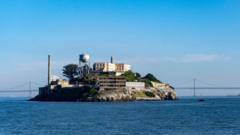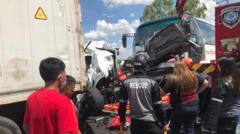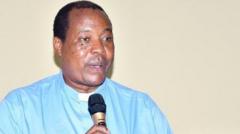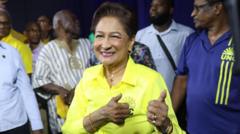Rodrigo Duterte's recent admission during a Senate inquiry highlights the violent tactics employed in his anti-drug campaign, drawing attention to the ongoing impact on families and the broader implications for law enforcement and human rights.
**Duterte Acknowledges Role in 'Death Squad' During Drug War Investigation**
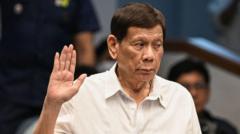
**Duterte Acknowledges Role in 'Death Squad' During Drug War Investigation**
Former Philippine leader reveals controversial measures taken against crime, reigniting debates on human rights.
Former Philippine president Rodrigo Duterte has made headlines after admitting to the existence of a "death squad" that he utilized to combat crime while serving as mayor of Davao City. In a Senate investigation related to his infamous war on drugs, Duterte revealed that this squad was comprised of gangsters to whom he allegedly issued death threats, stating, "kill this person, because if you do not, I will kill you now."
This admission comes amid ongoing scrutiny of his presidency, particularly regarding his promise to replicate his anti-crime successes in Davao on a national level after he was elected in 2016. His nationwide anti-drug campaign has been linked to the deaths of thousands of alleged drug suspects, prompting investigations from the International Criminal Court (ICC).
During the inquiry, Duterte defended his controversial policies, asserting, "I offer no apologies, no excuses. I did what I had to do." He reiterated his disdain for illegal drugs while denying that he authorized police to eliminate suspects directly, instead claiming that the death squad was formed by gangsters, not law enforcement. “I had a death squad of seven, but they were not police, they were gangsters,” he recounted.
In a display of his unwavering stance, Duterte expressed frustration over the ongoing drug issues, saying that many criminals had returned to their activities after he stepped down as president. “If given another chance, I'll wipe all of you,” he stated, highlighting his readiness to enact further measures against drug trafficking should the opportunity arise again.
This inquiry marked the first occasion Duterte faced families of victims from his drug war and former senator Leila de Lima, a notable critic who spent years imprisoned on drug charges that were later rescinded. Estimates from the Philippine government attribute over 6,252 killings to his anti-drug campaign, though human rights organizations argue the true figures may be much higher.
International criticism of Duterte’s drug war has been extensive, particularly concerning accusations that police officers were given implicit permission to kill. Reports from rights groups and the UN's High Commissioner for Human Rights have indicated that Duterte's rhetoric may have contributed to a climate that facilitated extrajudicial killings under the guise of law enforcement.
Duterte’s aggressive approach has garnered a following in a nation grappling with widespread drug abuse, particularly the use of methamphetamine, known locally as "shabu." The stark divide between supporters and opponents continues to fuel discussions on the balance between crime prevention and human rights in the Philippines.
This admission comes amid ongoing scrutiny of his presidency, particularly regarding his promise to replicate his anti-crime successes in Davao on a national level after he was elected in 2016. His nationwide anti-drug campaign has been linked to the deaths of thousands of alleged drug suspects, prompting investigations from the International Criminal Court (ICC).
During the inquiry, Duterte defended his controversial policies, asserting, "I offer no apologies, no excuses. I did what I had to do." He reiterated his disdain for illegal drugs while denying that he authorized police to eliminate suspects directly, instead claiming that the death squad was formed by gangsters, not law enforcement. “I had a death squad of seven, but they were not police, they were gangsters,” he recounted.
In a display of his unwavering stance, Duterte expressed frustration over the ongoing drug issues, saying that many criminals had returned to their activities after he stepped down as president. “If given another chance, I'll wipe all of you,” he stated, highlighting his readiness to enact further measures against drug trafficking should the opportunity arise again.
This inquiry marked the first occasion Duterte faced families of victims from his drug war and former senator Leila de Lima, a notable critic who spent years imprisoned on drug charges that were later rescinded. Estimates from the Philippine government attribute over 6,252 killings to his anti-drug campaign, though human rights organizations argue the true figures may be much higher.
International criticism of Duterte’s drug war has been extensive, particularly concerning accusations that police officers were given implicit permission to kill. Reports from rights groups and the UN's High Commissioner for Human Rights have indicated that Duterte's rhetoric may have contributed to a climate that facilitated extrajudicial killings under the guise of law enforcement.
Duterte’s aggressive approach has garnered a following in a nation grappling with widespread drug abuse, particularly the use of methamphetamine, known locally as "shabu." The stark divide between supporters and opponents continues to fuel discussions on the balance between crime prevention and human rights in the Philippines.









